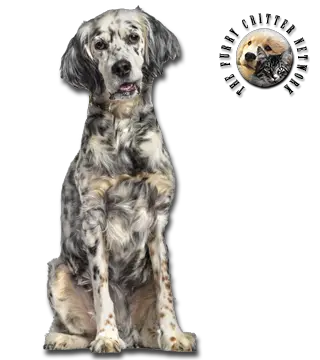Breed Standard
Head: Of medium length and width. Well-chiseled, but not excessively. Pronounced brow bones. Sloping stop. Slightly domed nosebridge a bit shorter than the skull. Brown nose. Upper lip does not cover lower lip.
Ears: Well set-on, covered to rounded tips with wavy, silky hair.
Eyes: Fairly large, oval, dark amber.
Body: Slightly elongated. Slightly arched neck without dewlap. Cleanly cut, pronounced withers. Broad, spacious chest. Loin broad, not too long. Tuck-up. Horizontal, level back. Broad, rounded croup
Tail: Reaching to the hock, carried sloping or curved loosely in an S. Covered with long, wavy hair.
Hair: Long and wavy on the ears, backs of the legs, and tail. Flat, silky, and dense on the body, with some waviness behind the neck and on the upper chest. Close-lying and fine on the head.
Coat: White and brown with moderate patching. Sometimes heavily marked with irregular patches with slight to moderate spotting, or moderately spotted and roan. Brown ranges from cinnamon to dark liver. White flare on the head desirable.
Size: Dog: 56 to 61 cm (22-24 in). Bitch: 55 to 59 cm (21.5-23 in).
Weight: Approx. 25 kg (55lb).
History
Like all the other spaniels who became the first pointers, the French Spaniel is a distant descendant of the longhaired Chien d'Oysel "setter" of the Middle Ages. By the sixteenth century, the French Spaniel was widely used by game bird hunters. After a decrease in population due to competition with English breeds, the French Spaniel was revived in the nineteenth century by Father Fournier. The first standard, written in 1891 by J. de Connick, describes the breed as larger and more powerful than the Brittany Spaniel. The French Spaniel is virtually unknown abroad, and the breed's population in France is low, despite renewed popularity.
Behavior
Hardy, courageous, persistent, and enthusiastic, the French Spaniel is appreciated for his work on rugged terrain. He is a flusher and excels at work in the water. With an excellent nose but less speed and a more limited search range than the Brittany Spaniel, he hunts at a gallop or extended trot. He points very precisely and is one of the best retrievers. The French Spaniel has a friendly and outgoing personality and is well balanced and patient. It is not a naturally aggressive dog, is eager to please and thus can be trained easily. A dog of this breed will form a strong bond with its master, being typically a working dog. It has a high level of stamina and requires vigorous exercise. Calm, even-tempered, intelligent, very attached to his owner, and gentle with children, he is a great pet. He needs firm but gentle training.
The French Spaniel is built for country life. He does not like being left alone and needs to run every day. He requires brushing twice weekly and regular attention to the ears.
Function
Hunting Dog, Companion Dog.
Health
The breed is robustly healthy with few issues and adapts well to wet weather conditions. A dermatological condition known as acral mutilation and analgesia may affect French Spaniels. It is a newly recognised disorder, with symptoms becoming apparent between three and a half months and a year of age.






